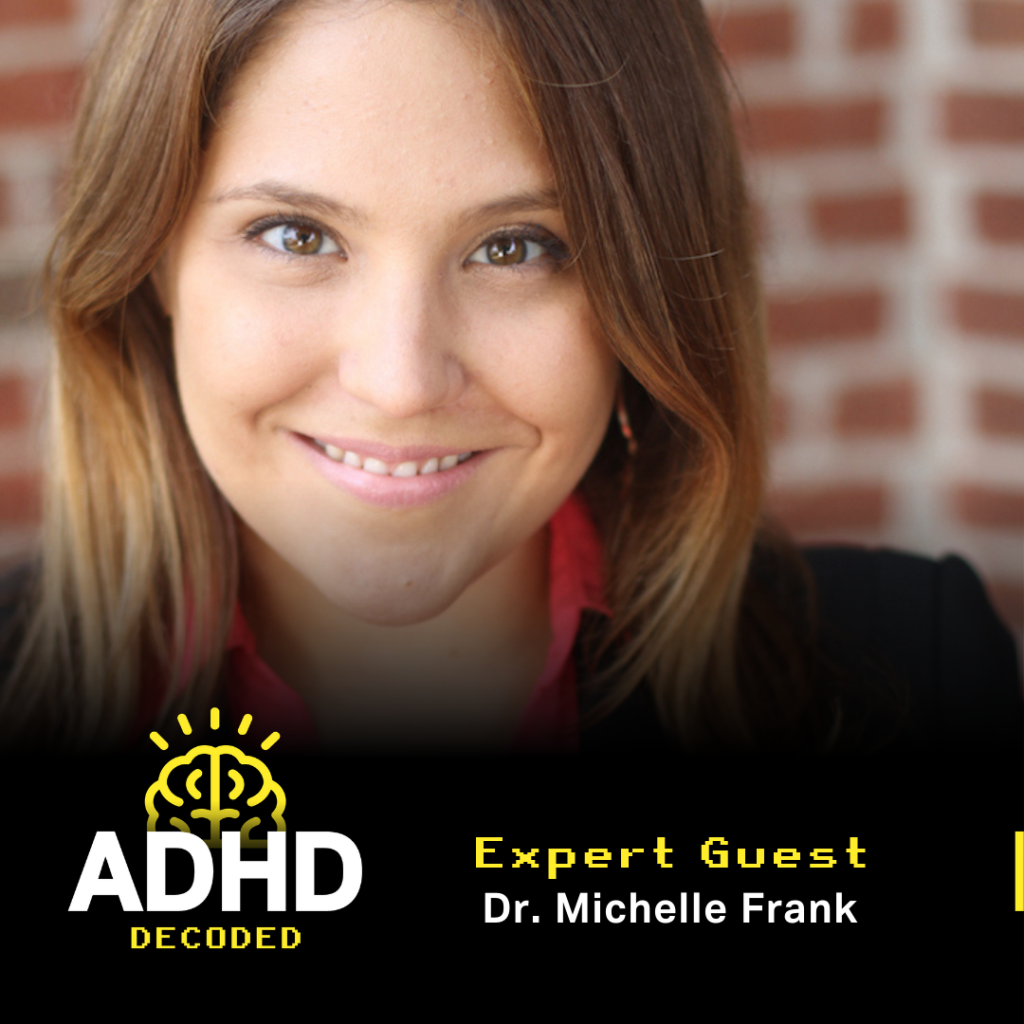In the third episode of ADHD Decoded podcast, Amanda is joined by Dr. Michelle Frank, a writer, speaker and clinical psychologist who specializes in the diagnosis and treatment of adults with ADHD. On this episode the two discuss the emotions that come with ADHD.
Dr. Frank explains that people with ADHD are more likely to experience emotional overwhelm based on how their mind works. ADHD life is also tends to come with feeling rejected, judged, or like the outsider. This causes people with ADHD to perceive that they are being rejected even if they are not; this is called Rejection Sensitive Dysphoria. When this happens, it’s important to recognize the need to give the brain a break so it can start to engage in healthy coping.
The first thing one has to do to engage in healthy coping is be in the moment and deal with what is happening on the body on a physical level by practicing mindfulness and paying attention to what they are feeling. From there, resiliency can begin to be built up. It is important to plan how to respond to situations like this before finding oneself in the moment. Another great tool is practicing positive self-talk. Dr. Frank recommends adding gratitude journaling to daily rhythms to help for encouragement and coping. It’s important to focus on interpreting and learning from the emotion rather than just trying to overcome it – not everything needs to be solved immediately.
Listen to the episode
Other ways to Listen:
Featured Expert: Dr Michelle Frank

Key Ideas:
- 1:29 – Dr. Frank explains the two main reasons people with ADHD have different responses to emotions than people who are neurotypical.
- 3:22 – Dr. Frank explains what is happening with someone who is experiencing Rejection Sensitive Dysphoria.
- 4:42 – Dr Frank gives advice on how to cope with the emotions that come with having ADHD. This includes mindfulness and building up resiliency.
- 9:13 – The two describe how positive self-talk is a muscle that needs to be worked to build up strength over time.
- 12:02 – Dr. Frank shares that the emotional disposition of people with ADHD can be a strength and doesn’t have to be a burden.
- 14:46 – Dr. Frank shares John Gottman’s quote, “The avoidance of conflict is betrayal.”
Episode Transcript
Amanda:
Welcome to the ADHD decoded podcast, your roadmap to understanding the ADHD brain. Here we offer you brain hacks to inspire and empower you to take charge of your life. Whether you are recently diagnosed, have been coping for years, think you might have ADHD or are wanting to learn more about the ADHD brain in general, then this podcast is for you. I am your host, Amanda Fischer and this is brought to you by the Kaleidoscope society. Hi Dr. Frank. Thank you so much for joining us on this episode of Emotions Decoded.
Amanda:
We know that ADHD impacts more than just our attention it affects our emotions too. Many ADHDers years are highly sensitive, experience strong emotions and feel out of control. For example, within the past year I’ve personally experienced quite a bit of rejection from pursuing different relationships and have really felt what the cool kids say these days, which is all the feels that personally feels like a huge stump to get over. So in situations like this where there’s sadness and rejection and disappointment, can you explain how these kinds of situations impact us ADHDers and our emotions?
Dr. Michelle Frank:
Yeah, definitely. There are two parts to that and the first is on a biological level, people with ADHD are more likely to experience emotional overwhelm because of how the brain works. So the amygdala is part of the emotion mind that gets hijacked and something called the default mode network, which is a processing pathway just doesn’t quite turn off when we need it to, which means we get a lot of thoughts and inner talk that’s just sort of always interjecting. It’s like peanut gallery, but you can’t tune it out, right? So you get that paired with a high emotional response in your body and that can be really uncomfortable. So that’s one way that ADHD plays in to what you’re talking about is that ADHDers really do struggle with emotional regulation. That’s part of it. Most are highly sensitive people. The second piece is that ADHD life tends to come with a lot of experiences where you feel like the outsider, you feel not good enough, you feel rejected or judged.
Dr. Michelle Frank:
And too because of that, people with ADHD tend to develop something we call rejection sensitivity dysphoria, which means they tend to be hypersensitive to perceive rejection even if it’s not there. That they’re so afraid of being judged and rejected and not good enough that sometimes they jump the gun and anticipate it or experience it as if it’s happening even when it’s not. So our old experiences and our old wounds can come up and suddenly feel very present even though they belong in the past. Those are two ways that ADHD and emotion can get tangled up and lead to some pretty serious emotional flooding and overwhelm.
Amanda:
Guilty. All right. What is going on in our brains when this is all happening?
Dr. Michelle Frank:
A few things. One is you’re getting emotionally hypo aroused. Your sympathetic nervous system is kicking in and you’re going into fight or flight because your emotion mind, that amygdala I’m talking about gets overloaded and you’re not able to put on the brakes with the emotions. It’s just like how so nice people with ADHD can’t put on the brakes with other things. I don’t know if you’ve ever heard the term race car brain, bicycle brakes. That’s what Ned Hallowell talks about with ADHD brain. Well, it’s the same with emotions. For people with ADHD, there’s literally the gates get flooded.
Dr. Michelle Frank:
And so when that happens, it’s important to recognize that we have to go into the body and we have to take a break because when we’re emotionally flooded, our brain cuts off connection with our frontal lobe our reason mind. The part that makes rational decisions. The part that easily communicates our feelings and our needs, our resources get pulled away from that so that we can protect ourselves. So when this is happening, it’s important to recognize okay, I’m emotionally flooded. It’s something that’s happening on a biological level and I need to remove myself and engage in some healthy coping.
Amanda:
So can you talk a little bit more about that? So when the gates are flooded how can we gain resiliency from experience such low points?
Dr. Michelle Frank:
Well, again, I think there’s two parts. I think the resiliency comes later. The first thing you have to do is be within the moment. And in order to do that positive self talk can go a long way, but sometimes you have to deal with what’s happening in the body on the body level. So things like mindfulness, deep breathing exercises, progressive muscle relaxation, a body scan where you take a few deep breaths, calming breaths, center yourself and you just scan as if like a light, either like a sunlight or even just a scanner. Sort of like going down your head, noticing your jaw, your neck, your shoulders, all the way to your toes, getting into your body, just paying attention.
Dr. Michelle Frank:
What sensations are coming up for me? Do I feel heaviness? Emptiness? Is my stomach flipping? Do I feel tension in my shoulder? Do I feel tingliness in my hands? Where am I at? Slowing down and helping your brain and body put on the brakes. Pump the pause button so that you can reengage with what’s really happening in the moment instead of being stuck in fight or flight. Once you’ve done that, and this can take up to a half hour to get your parasympathetic nervous system to override the fight or flight. Then you can start using some cognitive techniques, asking yourself, okay, these thoughts I’m having do I know that they’re really true? What else could possibly be true? You can engage in some other coping skills, some positive self-talk. You can try to expand the perspective by looking for some positive things as well as the hard stuff so you’re not just narrowing in only on the bad stuff. So then you can start doing some of the cognitive work.
Dr. Michelle Frank:
But first I think it starts with removing yourself from what’s stressing you out and doing some sematic exercises to get into your body and such bringing your heart rate down, getting your cortisol and adrenaline levels down so that you can be more present and you can access that wise mind, that part of yourself that makes good choices. From there then you can start building up resiliency. You can have a plan, “Okay, what does it look like to cope ideally with a situation like this in the future? What am I going to do in these situations? Who do I want to show up as in these situations? Who do I want to be? Even though I have these strong emotions, what do I want to be about?” And letting our values guide our actions, not our fear or our emotional reactivity.
Amanda:
Dr Frank you mentioned the idea of positive self talk and I was wondering if you’d talk a little bit more about that. Like how can one begin to have positive self talk? Because as ADHDers we already have unfortunately negative view of ourselves, so how can someone grow and positive self talk?
Dr. Michelle Frank:
Yeah, and research validates that ADHD years are much more likely to have a whole host of self critical thoughts in a day. So one is, I know it sounds cheesy but it does work, is to practice some gratitude journaling. The reason for this is it starts building a muscle in your brain that notices the positive, not just the negative. Our brains tend towards that negativity bias to all those negative self statements. Sometimes when we’re in that space it’s hard to convince ourselves that the thought we’re having isn’t true. So if I’m feeling like a failure in this moment, I can’t always talk myself out of that, but I can start to broaden my perspective so I can notice something I’m grateful for in that moment.
Dr. Michelle Frank:
Something I’m good at, I can add an and. I feel like a failure and that doesn’t make it true. Acknowledging you don’t have to believe everything you think, but recognize that positive self talk is hard and it’s a practice. It doesn’t happen naturally all the time. So having some affirmations, some positive self statements, mantras, whatever works for you. Even like a visual in your head of something that represents something good and positive in a whole about you to balance it out at the very least. Like kicking your defense attorney. I always find it’s helpful to ask would I talk to a friend this way? And if my answer is no, which it often is, okay, then I notice that and see how I can pivot.
Amanda:
It seems like this positive self talk idea is like a muscle in and of itself.
Dr. Michelle Frank:
It is.
Amanda:
The more you work it, you build up its strength over time, the more it’s going to positively impact your life and you’re going to be able to strengthen you.
Dr. Michelle Frank:
Definitely.
Amanda:
So Dr. Frank can you tell our listeners how to overcome having such intense feelings? Like what brain hacks can you give our listeners and how to better ride the wave of emotional sensitivity?
Dr. Michelle Frank:
Yeah, so I think it’s not as much about overcoming the emotion as it is accepting that it’s there and using it as information. That starts with taking the pause, removing yourself, slowing down, doing some of the somatic exercises I talked about a minute ago and then asking what does this mean? What information is this giving me? If I’m angry, maybe I feel like a boundary has been crossed or threatened. If I’m jealous, maybe there’s something I feel lacking in or aspire to or there’s some place I need to strengthen my belief in myself.
Dr. Michelle Frank:
If I feel anxious, what’s going on? What is making me feel unsafe? So once you slow down and do some of the exercises I mentioned a minute ago, then you can ask what does this mean and what’s the next right step? You don’t have to solve the whole day, you just have to know what is the next right action. Maybe that means going and getting a glass of water and then deciding what’s next from there. But the more you slow it down, the better because your brain in that moment is going really, really fast. So the more you can take space and slow down, the better off you’re going to be because it buys you time. You need to give yourself about 30 minutes to get into a space where you can be in the act of problem solving space. So again, I highly recommend mindfulness. I really like a five, four, three, two, one exercise, which is name five things you can see, four things you can hear, three things you can feel, two things you can smell, one thing you can taste.
Dr. Michelle Frank:
So I like to make a cup of tea with that one that’s a really good one. Go for a walk and listen. How many different sounds can you hear? Dance, be in your body, be in the moment and practice putting on the brakes.
Amanda:
Oh my gosh. I love that. That’s a new one. I’m definitely going to try that one. Another thing you mentioned that resonated with me was just doing the next right thing. It seems like our anthem should be that song from frozen two that Elsa sings, do the next right thing.
Dr. Michelle Frank:
Yep. Yep. Exactly.
Amanda:
How might our emotional sensitivity be a strength in our careers and our personal lives?
Dr. Michelle Frank:
The emotional sensitivity piece gives people with ADHD a perspective and the depths that might not always be there otherwise that might be taken for granted. People with ADHD tend to be pretty compassionate and understanding people and they certainly can relate to the hardships of others. And because of that, I think they can make really good supports and they can really model self care and living with integrity and wellness because they have to. In a way that serves their family and their friends and communities.
Amanda:
And how can an ADHDer better communicate about their emotions to their loved ones?
Dr. Michelle Frank:
So first it’s notice you’re flooded, slow down, remove yourself. Say, I’m noticing I’m emotionally flooded right now let’s come back to this conversation because no progress is going to be made if even one person in a duo is flooded. Just remove yourself first, regulate yourself first. So deal with your own emotions knowing that you cannot be the architect of their experience you can only control your own. And then when you return, really identify what you need.
Dr. Michelle Frank:
Under most complaints or arguments, there are unmet needs. So go underneath. What are you really upset about? And is it the surface level thing? If it’s a partner about doing the dishes, are you really arguing about doing the dishes or are you arguing about someone didn’t feel heard or someone didn’t feel valued or cared for? Right? Usually there’s a deeper meaning, so find the deeper meaning and what’s triggering you and use that as information to understand your own needs. And then it’s okay to be direct and ask for what you need, but a good way to do that is to soften your startup. If we go in just all reactive with our emotions and I need this and I feel this way, the other person is not going to be able to receive that, they’re going to get flooded and they’re going to get defensive and then we’re going to be stuck in the same position.
Dr. Michelle Frank:
So soften the startup and that just means apologizing for your part in things or acknowledging, Hey, I know this is a hard day for both of us or thanks for letting me take a break for a little bit that meant a lot to me. So it’s just soften the startup and then present your feelings using nice statements and present your needs. But it’s also important that you don’t over apologize or back off because you think your needs aren’t valid. They are. So be direct and be secure and also be kind. Remember that John Gottman, he’s a relationship researcher, I really love. The Gottman’s have a lot of content out there that’s phenomenal on romantic relationships and conflict. And one thing he says is avoidance of conflict is betrayal.
Dr. Michelle Frank:
I think that’s really powerful and a lot of times with ADHD it’s easy for these things to go underground because you just don’t want to deal with it. You don’t want to be judged. The shame monster kicks in, but recognizing that we deepen relationships by sharing our feelings and what we need and by being vulnerable. And giving the other person the chance to meet us in that space can be really powerful in healing if we let it.
Amanda:
Wow! That quote, you said his name is John Gottman?
Dr. Michelle Frank:
Yeah.
Amanda:
That avoidance of conflict as betrayal. Oh my gosh.
Dr. Michelle Frank:
Right?
Amanda:
I think that’s so real, that will make you think. So I think one of the main challenges of when you find yourself in an argument with a loved one our impulsivity, our ADHD impulsivity kind of can come first sometimes and show our uglier side. And so I think what you said about taking a step back and softening our start up and being gentle and kind and just giving ourselves a moment to gather our thoughts and not let our emotions get the best of us, it’s really just really, really helpful advice. So thank you so much for everything that you’ve shared with our listeners in this episode of Emotions Decoded. That brings us to the very end of our episode, so thank you so much Dr. Frank.
Dr. Michelle Frank:
You’re welcome. You’re welcome. I hope this was helpful.
Amanda:
Thank you for tuning in to the ADHD decoded podcast brought to you by the Kaleidoscope society. This is your host, Amanda Fischer. Until next time.





Hello,
I have researched the adult ADHD topic for a couple of months.
I have been endlessly trying to find out what is wrong with me. Blaming myself for not being good enough, comparing myself with other moms who seem to have everything under control whilst I struggle with the minor tasks. Tried blaming my thyroid and when the tests kept coming back within range, I wasn’t prepared to accept that it was just a depression. I kept analysing my thought process and behaviour trying to identify the triggers of my frustration, self-doubt, procrastination, forgetfulness and all the other overwhelms of my life.
I came across your posts/articles which pieced together so well a lot of what I am feeling into the condition which I have been researching for a while. I have come across quite a few websites, but this is the best so far. I wanted to let you know.
I feel like suddenly everything I am feeling makes sense.
Thank you..